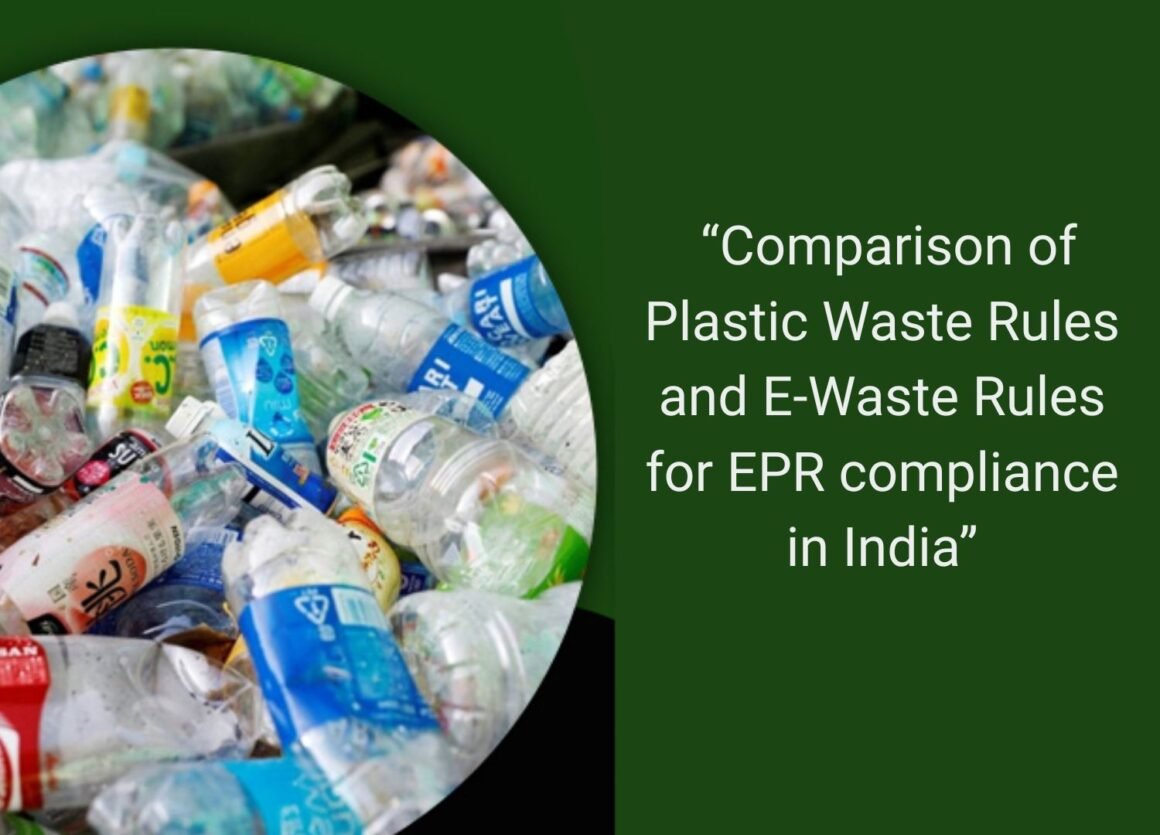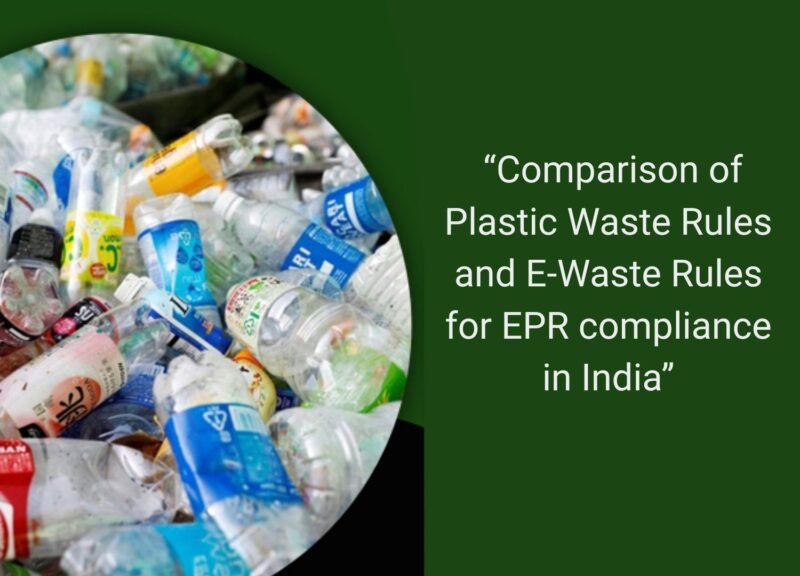Understanding compliance today means avoiding penalties tomorrow—here’s how Plastic Waste Rules vs E-Waste Rules impact your business.

India is one of the fastest-growing economies in the world, but with industrial growth comes a parallel rise in waste generation—especially plastic waste and electronic waste (e-waste). To tackle this challenge and promote environmental sustainability, the Government of India has introduced two important regulatory frameworks: the Plastic Waste Rules and vs E-Waste Rules.
Although both are rooted in the principle of Extended Producer Responsibility (EPR), they apply to different sectors and involve different compliance requirements.
Plastic Waste Rules vs E-Waste Rules
This article explains the key differences between Plastic Waste Rules vs E-Waste Rules in India, helping businesses understand their legal obligations and avoid penalties. Whether you are a manufacturer, importer, brand owner, distributor, or recycler, this compliance guide will give you clarity on what rules apply to your business and how to stay compliant.
What Are Plastic Waste Management Rules?
The Plastic Waste Management Rules, first introduced in 2016 and amended in 2018, 2021, and 2022, aim to regulate the production, use, and recycling of plastic in India. These rules specifically focus on reducing plastic pollution and holding producers accountable for the end-of-life disposal of plastic packaging.
Objectives of Plastic Waste Management Rules:
- Reduce plastic waste generation
- Promote reuse and recycling of plastic
- Ban specific categories of single-use plastics
- Enforce Extended Producer Responsibility (EPR) for plastic packaging
- Introduce recycled content and traceability requirements
Plastic waste mainly consists of packaging materials like carry bags, wrappers, pouches, and multilayered packaging used by FMCG brands, supermarkets, e-commerce companies, and packaging manufacturers.
What Are E-Waste Management Rules?
The E-Waste Management Rules, 2022 replaced the earlier 2016 rules to strengthen e-waste regulation in India. These rules apply to manufacturers, importers, refurbishers, dismantlers, and recyclers of electrical and electronic equipment (EEE).
Objectives of E-Waste Management Rules:
- Ensure safe collection, storage, recycling, and disposal of e-waste
- Promote formal recycling and reduce informal dumping
- Prevent environmental and health hazards from toxic components like lead, mercury, and cadmium
- Implement a centralized online portal for EPR compliance under CPCB
- Assign annual recycling targets for electronics producers
E-waste includes discarded electrical equipment like smartphones, laptops, printers, air conditioners, televisions, cables, batteries, and other gadgets.
Both the Plastic Waste Management Rules and the E-Waste Management Rules are crucial pillars of India’s approach to environmental compliance and sustainable waste management. While both frameworks are built on Extended Producer Responsibility (EPR), their scope, compliance mechanism, and enforcement differ significantly.
The Plastic Waste Rules target FMCG brands, packaging manufacturers, and importers who use plastic in product packaging, whereas the E-Waste Rules focus on producers and importers of electrical and electronic equipment.
For businesses, compliance is no longer optional. The Central Pollution Control Board (CPCB) has tightened environmental enforcement with digital EPR portals, recycling targets, and environmental compensation for violations. Companies that ignore these regulations risk license cancellation, penalties, and reputational loss. On the other hand, compliant businesses can turn sustainability into a competitive advantage and build stronger ESG credentials.
To stay compliant and future-ready, companies must:
- Identify whether they fall under PWM Rules, E-Waste Rules, or both
- Register under CPCB’s EPR portal
- Partner only with authorised waste processors and recyclers
- Maintain annual returns, documentation, and traceability records
- Implement internal compliance frameworks within supply chains
In the coming years, India will continue to push forward its sustainability agenda under the Swachh Bharat Mission, National Resource Efficiency Policy, and circular economy roadmap. Businesses that act now will not only avoid penalties but also lead their industries in responsible, sustainable growth
FAQ: Plastic Waste Rules vs E-Waste Rules
What is the role of EPR in both rules?
Extended Producer Responsibility (EPR) is mandatory in both Plastic Waste Rules and E-Waste Rules. Under EPR, producers must ensure collection, recycling, and environmentally safe disposal of waste generated from their products.
Who needs EPR registration for plastic waste?
All PIBOs—Producers, Importers, and Brand Owners—who use plastic packaging must obtain EPR registration from CPCB under the Plastic Waste Management Rules.
Who needs EPR registration for e-waste?
Manufacturers, importers, refurbishers, and producers of electrical and electronic equipment (EEE) listed in Schedule I of the E-Waste Management Rules are required to register on the CPCB EPR portal.
What happens if a business does not comply with these rules?
Non-compliance can lead to penalties under the Environmental (Protection) Act, 1986, including fines called Environmental Compensation (EC), cancellation of licenses, and legal action.
Can a business fall under both Plastic Waste Rules and E-Waste Rules?
Yes. For example, an electronics company selling mobile phones with plastic packaging must comply with both PWM and E-Waste Rules.
Are MSMEs exempt from compliance?
No. The rules apply to all eligible entities regardless of their size, including startups and MSMEs, if they produce, import, use, or sell plastic packaging or electronic products.
What is the CPCB EPR Portal?
The CPCB EPR Portal is an online platform where producers and importers register and submit EPR plans and annual returns for plastic waste and e-waste compliance.
Do these rules apply to e-commerce companies?
Yes. E-commerce companies that use plastic packaging or sell electronic goods must register and comply with EPR obligations.
What is the validity of EPR registration in India?
EPR registration is valid for the duration specified by CPCB and must be renewed periodically along with submission of compliance reports.
FOR MORE BLOGS – beyondthepunchlines.com

 Add to favorites
Add to favorites






